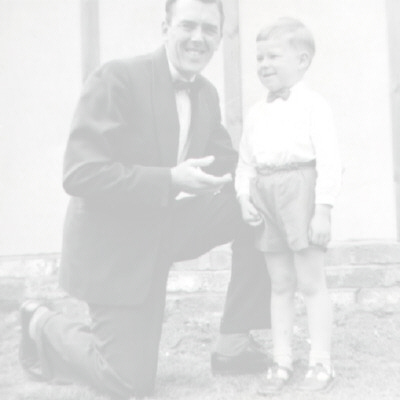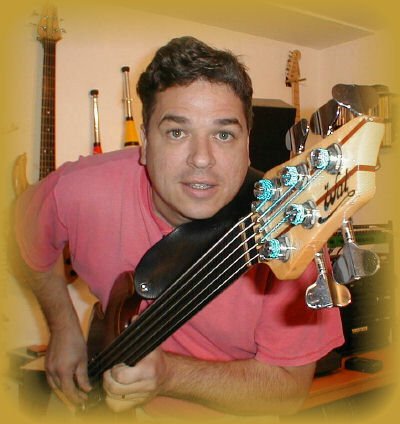GB:
Letís
begin with the basics. Date of birth, location, etc.
LC: 1961
Swansea, Wales
GB: Did
you study bass privately?
LC: No.
I studied Trombone to a proficient level (for a 10 year old) then translated
it to bass.
GB: Were
you parents supportive?
LC: Totally,
My father was a piano player and my mother came from a musical family. My
Dad used to do all sorts of gigs; he introduced me into his vaudeville act
when I was 2. Heíd carry me on stage in a suitcase and do a ventriloquist
sketch, with me as the dummy. It hasnít affected me at aaaaaaaaallllllllll.
Later my Dad showed me how chords were built and harmony tips and my Mum
encouraged me to practice every day
GB: Did
you study music at a University?
LC: My
main objective in school was to entertain the class and disrupt any learning
activities. Consequently I did not have the qualifications to go to
University. Ironically, I occasionally teach at the Royal Academy of Music
and the kids there have such a wonderful opportunity and are in such a great
environment Iím slightly envious.
GB: Why
did you choose bass, what inspired you to embark on a career in Music?
LC: My
Dad put me on Bass when he changed the line-up of his band. I was playing
trombone, my older brother, Richard was on Clarinet and the eldest, Dave,
played trumpet. We played mainly Traditional Jazz, which was quite popular
in Britain in the 60ís and 70ís. To move with the times I went on to
bass and Richard went to Sax, More gigs.
GB: Do
you play acoustic bass as well as electric?
LC: No,
Iíve tried a couple of times. I have a hard enough time keeping in shape
on my electric, without having to learn another instrument. There are so
many incredible upright players here. When my music requires it Iíll get a
top-notch-chappy to do it.
GB: Session
work is hard to come by in the US these days. Do you feel that your writing
skills have given you an advantage over bassists that arenít composers?
LC:
I have never been a busy session face; I donít have those chops. I am in
awe of the guys that can do that. Iím usually asked to do things by people
who know my playing and what I can (and canít) do. I would not have
been able to support my family if I relied on my bass playing. Iím
dedicated to the instrument, but I had to diversify.
GB: Tell
me about your relationship with Percy Jones.
LC: My
association with Wal basses goes back a long way and in 1980 they had
made a new model for Percy. I offered to take it to New York to deliver it.
This was when I first met Percy. He
pulled this bass out and played, I couldnít believe that I was the only
guy listening to all this incredible stuff. In the evening Mike Clarke
from the Headhunters came over, what a thrill hanging out (briefly) with
these musicians. Iíve seen Percy off and on in the last twenty years and
still try to get hold of any recordings by this unique innovator.
GB: How
did you get the call to play on Sabbathís 'Headless Cross'?
LC: I
played with Keyboard player Don Airey in a tiny pub near Cambridge
and he asked me to play on his 'Album K2'. This is where I met Cozy
Powell. We had some good jams, Iíve got a tape of the three of us
playing 'Giant Steps'. I worked with Cozy on many projects around that time
including his solo album, with Gary Moore and Jan Akkerman.
When Cozy was producing 'Headless Cross' he asked me to go to
Birmingham for Tony to hear me play (I think) and I did the record.
GB: Your
work on Tony Iommi`s latest CD is brilliant. What equipment did you
use?
LC: I
used my Wal five string fretted bass, I did try fretless on one track but it
was after we came back from the pub, so there were tuning problems! (no
change there). If anyone hears that Iíll be finished.
GB: Were
you able to use an amplifier, or did you just DI into the console?
LC:
Both. Bob Marlette knew what he needed from me (musically) and he got a
great sound. I took my SVT but Bob had his eye on the B15 that was lying
around the studio, so we tried that first and it sounded just right. We also
took the D.I. from my bass into the console.
GB: Are
you a capable recording engineer?
LC:
I donít think so. When I record at home I just get everything on to tape
at a good level with no EQ. I leave all the tricky stuff up to the mix
engineer.
GB: Can
you describe your home studio?
LC: I
have two Tascam DA88 digital tape machines and a Yamaha 01 mixer. I have
recorded tracks that have ended up on CDs but I use this set-up mostly for
demoís. Iíve a piano and a guitar and lots of brass instruments dotted
about. I donít use sequencers, I like to get ideas down quick and when
SYMPTE and computers get involved everything grinds to a halt.

GB: Why
are WAL basses your bass of choice?
LC: Over
the years Iíve had a great relationship with Wal basses. I just feel at
home with the basses, they feel great, the EQ system has so much scope and
is easy to use, the craftsmanship is wonderful, and bloody nice guys to
boot.
GB: Playing
with a great drummer is a bassists greatest joy. Who are your favorite
drummers, and who would you like to work with that you haven't yet?
LC: It
was a big thrill for me to appear on record with Peter Erskine a few
years ago. Recently I was playing a club in London and Bernard Purdie
walked in, so we got him to come and sit-in, that was brilliant. Itís so
exciting to play with chaps Iíve heard and admired on record. I would love
to jam with the new guys that have a great groove, jazz feel and odd-meter
chops.
GB: Your
solo CDs are fantastic, are they all currently available in the USA?
LC: There
is something on the Web-site.
GB: Are
you embarking on any major tours this year?
LC: It
doesnít look like it. Iíve just finished recording some commercial
tracks for EMI, so the rest of the year will be spent writing new material
for my own project.
GB: Past
and present, what bassists do you admire?
LC: When
I first started playing I was inspired by Jack Bruce and John
Entwistle, the solo on 'My Generation' knocked me out. Percy
Jonesí work with Brand X was groundbreaking. I listened to Stanley
Clarke and when I heard Jacoís solo album I thought he had
everything, soul, taste, chops, great writing and arranging skills and
supreme groove.
Jeff Berlin is phenomenal. I
love Anthony Jacksonís playing, Jimmy Johnson, Steve Swallow,
Gary Willis. Some time ago I spent some time playing with Dominic
Dupiazza which was wonderful. Recently, I was very lucky to be asked to
fill in for two amazing British guys. I was sent a CD to learn the parts
played by Pino Palladino, and trying to cop his feel was daunting,
but a great learning experience. Mike Mondesir couldnít make a gig
with the Django Bates band (Delightful Precipice) and I stood in for
him. Wonderful music and a great challenge.
GB:
Thank you, Laurence, for taking the time to answer a few questions.
